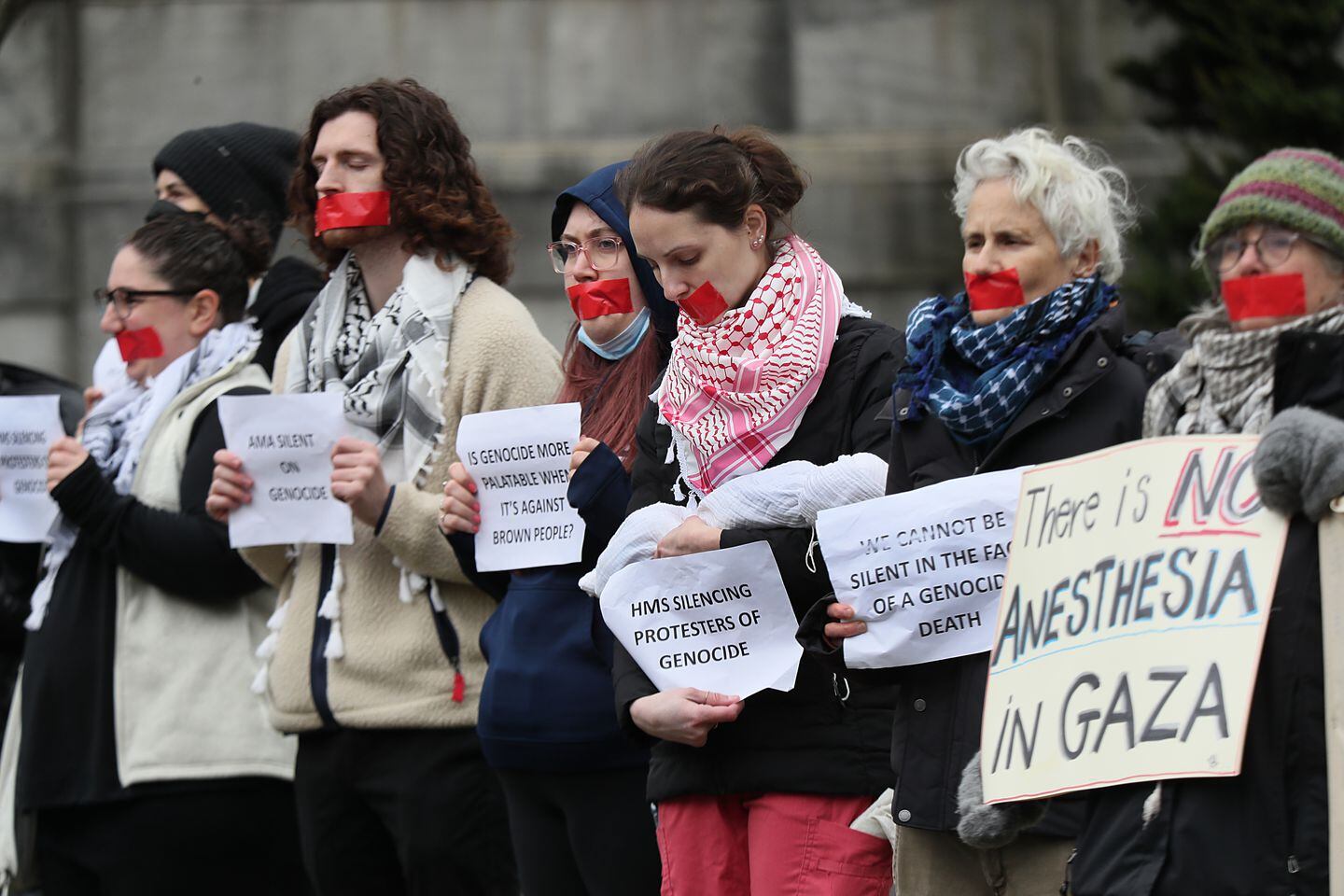The protest comes amid a mounting humanitarian crisis in Gaza.

More than 50 Harvard medical students and faculty assembled Friday morning to protest an event with the president of the American Medical Association, condemning the nation’s most powerful physicians’ lobby group for staying neutral on the worsening humanitarian catastrophe in Gaza.
Dr. Jesse Ehrenfeld, president of the American Medical Association, was delivering a speech at Harvard Medical School to commemorate “Match Day,” when thousands of future doctors across the country open envelopes that determine where they will work after graduation.
Students and family members walking into the normally celebratory annual event were greeted by a wall of mostly silent protesters bearing signs saying “Let Gaza Live!” and “AMA is complicit in genocide.” They are part of a growing movement of medical students and younger health care professionals across the country calling for an immediate cease-fire as a moral imperative, and they have become increasingly vocal in condemning public leaders and others for not doing so.
An AMA media relations person who was at the event declined to comment on the protest and the organization’s position on the war, while sharing a statement the organization made last November saying that it “stands with the physicians and health care personnel who are on the front lines of this crisis.”
A Harvard Medical School spokeswoman said in a statement that Ehrenfeld was invited to give a lecture “to reinforce the idealism, humanism and nobility of medicine” to the graduating class. “In delivering his timely and resonant remarks, Dr. Ehrenfeld saw and acknowledged some of our medical students who chose this forum to silently protest the AMA in a manner that was respectful,” the statement said.
Demonstrators both inside and outside the hall where Ehrenfeld’s lecture took place wore red tape on their mouths to draw attention to what they say is censorship by the Harvard Medical School leadership. As the event wound to a close, students unfurled a large banner from a balcony inside the building’s atrium that said, “AMA is Complicit in Palestinian Genocide.”
On Monday, Harvard Medical School’s dean, Dr. George Daley, sent an email to all medical students and faculty, reminding them of the university guidelines for “mutual respect and public discourse,” with a warning that disruption of school events could result in “long term professional consequences.”
”In our institutions, we have been very silenced when it comes to talking about Gaza,” said Dr. Hibah Osman, a physician and assistant professor at Harvard Medical School, whose voice was muffled by the tape. “The horror of it is these are young people who are just now graduating from medical school, so you can imagine how scary that is.”
The protest comes amid a mounting humanitarian crisis in Gaza, with the United Nations and aid agencies warning of looming famine in the besieged enclave of 2.2 million people.
The American Medical Association emerged as a target of pro-Palestinian protesters last November, when the group declined to consider a resolution proposed by medical students and trainees for a cease-fire in Gaza “in order to protect civilian lives and health care personnel.” Earlier, the AMA Board of Trustees had issued a statement acknowledging the “immense scale” of suffering and death in the Israel-Hamas war, while affirming the group’s commitment to “medical neutrality,” a principle of noninterference with medical services in times of armed conflict.
“Many of my fellow students and I have been fairly horrified by the AMA silence on the Gaza war,” said Aparna Nair-Kanneganti, a third-year student at Harvard Medical School and among the demonstrators Friday. “You can’t cleave to this notion of medical neutrality in a scenario where an entire ethnic group is dying.”
National groups such as Healthcare Workers for Palestine which helped organize Friday’s protest, argue the AMA has been inconsistent in its support for neutrality. Two years ago, the medical group issued a strong condemnation of Russia’s “unconscionable” invasion of Ukraine, calling it a humanitarian crisis that “our global community of physicians cannot ignore.” The AMA Foundation donated $100,000 to support relief efforts in Ukraine and to help the millions displaced by that conflict.
“It shows that the AMA doesn’t value Palestinian lives as much as Ukrainian lives, or non-white lives as much as white lives,” said Dr. Lianet Vazquez, a resident physician in Boston who worked at a hospital in Gaza two years ago while a student at Harvard Medical School. “This is not a question of medical neutrality. It’s a question of bias, of bias against Palestinians.”
- Photo: Harvard medical students and faculty protested an event featuring the president of the American Medical Association, over the physicians’ group’s repeated refusal to call for a cease-fire in Gaza.Suzanne Kreiter/Globe Staff
